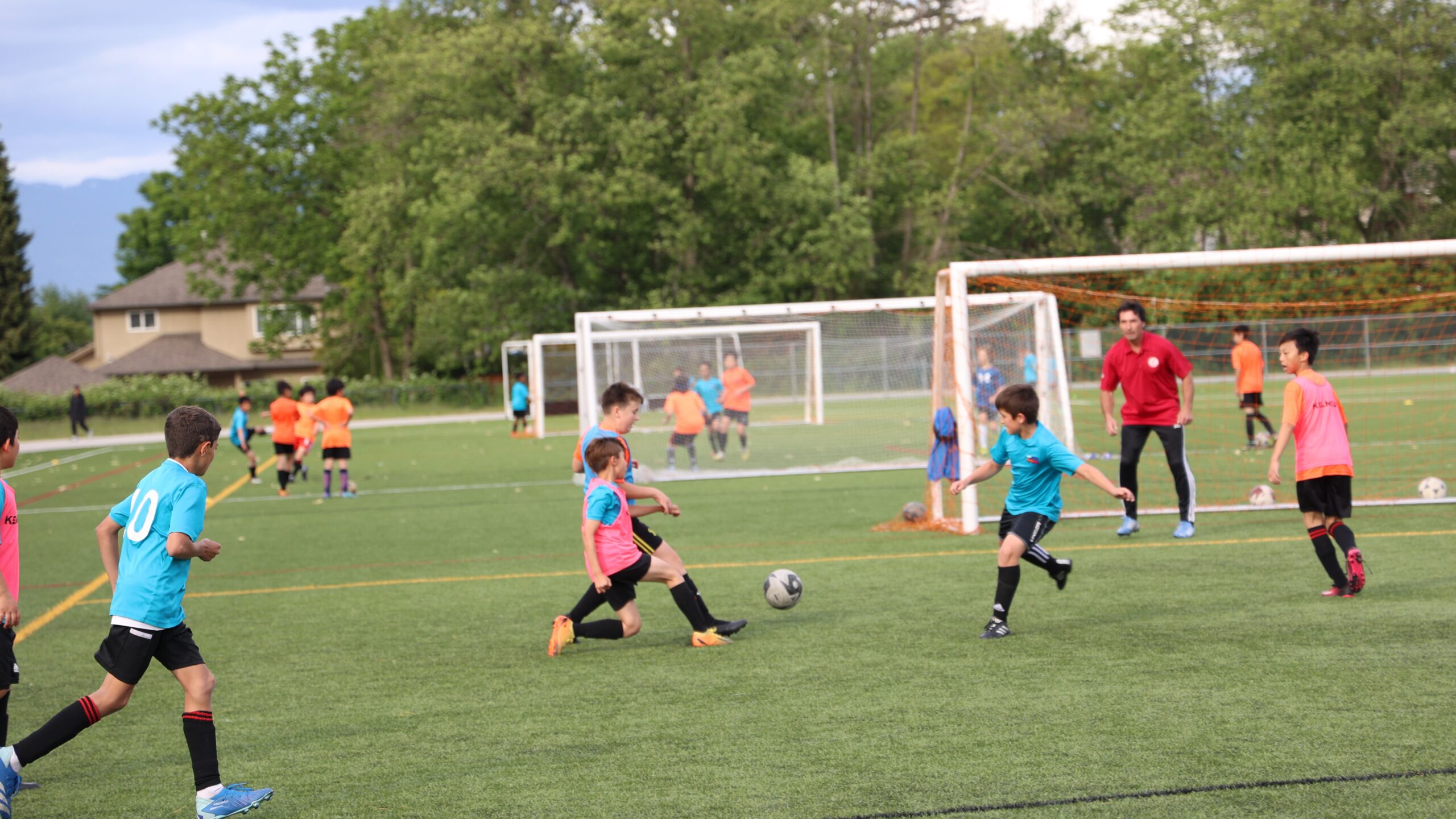Choosing the Perfect Youth Soccer Program: A Guide for Burnaby and New Westminster Parents
Youth soccer programs offer children a chance to develop skills, build character, and foster a love for the game. For parents in Burnaby, New Westminster, and the surrounding areas, understanding the types of soccer programs available and how to choose the right one is essential. In this article, we’ll break down the types of soccer programs, what to look for as a parent, and why thoughtful selection matters.
What is a Youth Soccer Program?
A youth soccer program is a structured plan designed to train young players in soccer skills, strategy, and teamwork. These programs often include training sessions and games and are tailored to different age groups, skill levels, and goals. Generally, youth soccer programs can be categorized into three main types: seasonal programs, specific skill programs, and soccer camps. Each type serves a unique purpose, ensuring children can find the best fit for their interests and development.
Seasonal Soccer Programs: A Foundation for Growth and Development
Seasonal soccer programs are the backbone of youth soccer, offering a structured and consistent environment for young players to grow their skills, build teamwork, and enjoy regular competition. These programs generally run from September to June, with breaks in December and March, providing a balanced schedule that accommodates school and family commitments. Their combination of training sessions and weekend games makes them a popular choice for parents looking to give their children a well-rounded soccer experience.
Structure of Seasonal Programs
The number of weekly training sessions varies depending on the player’s age, skill level, and the program’s goals. Here’s a breakdown:
-
For Younger Players (U4–U6):
At this age, the focus is on introducing children to the game in a fun and engaging way. These programs typically include 1–2 training sessions per week, helping young players develop basic motor skills, coordination, and a love for the game. -
For Older Players (U8–U12):
As children grow, the intensity and frequency of training increase. Most programs offer 2–3 training sessions per week, providing players with the opportunity to hone their technique, build stamina, and develop a deeper understanding of the sport. -
For Competitive Players (U11–U13):
High-level programs, such as Division 1 or BC Soccer Premier League (BCSPL), involve even greater commitment. Competitive players often train 3–4 times per week and play games on weekends. This rigorous schedule is designed to prepare players for elite competition and future opportunities in the sport.
What Makes Seasonal Programs Unique?
Seasonal programs are designed to deliver consistent development over an extended period, typically 8–9 months, ensuring players experience continuous growth. They not only emphasize skill-building but also instill discipline, teamwork, and resilience through regular training and game play. Here’s how these programs differ by level:
-
Recreational Programs (House Programs):
These are entry-level programs aimed at introducing the sport to new players. They’re accessible, affordable, and focus on fun and basic skills.- Weekly Schedule: 1 training session and 1 weekend game.
- Cost: Ranges from $300 to $700 CAD per season, depending on the player’s age.
-
Competitive Programs:
Designed for players looking to advance their skills and compete at higher levels, these programs are more intensive and require greater commitment.- Weekly Schedule: 2–4 training sessions and 1 game.
- Cost: Varies widely, from $800 to $4,500 CAD per season, depending on the club or academy, age group, and program level.
-
Youth Soccer Academies:
Academies often provide 2–3 training sessions per week, regardless of the player’s level. These programs are known for their structured approach, experienced coaching staff, and access to advanced resources.
The Role of Weekend Games
Games are a central component of seasonal programs, typically scheduled on weekends. These matches allow players to apply their training, test their skills against peers, and learn valuable lessons in competition. Participating in games builds confidence, fosters sportsmanship, and gives children a sense of accomplishment that keeps them motivated.
Costs of Seasonal Programs
The cost of seasonal programs can vary significantly based on factors like the age group, program level, and organization. Here’s a general guide:
-
Recreational Programs:
Affordable and beginner-friendly, these programs are ideal for young players and families on a budget. Younger age groups typically cost less, with fees rising as players progress through the ranks. -
Competitive Programs:
For families looking to invest in advanced training and competition, costs are higher due to the resources involved—such as licensed coaches, better facilities, and travel expenses for away games or tournaments. -
Residency Programs:
For the most dedicated players, some academies offer full residency programs for U13 and older. These include morning and afternoon training sessions, travel opportunities, and intensive development schedules. Costs for residency programs can range from $6,000 to $10,000 CAD per season, reflecting their premium nature.
Why Seasonal Programs Are Worth It
Seasonal programs provide children with a consistent platform to grow their skills and achieve their potential. Over the course of 9 months, players not only develop their technical and tactical abilities but also form friendships, learn discipline, and build confidence that extends beyond the soccer field.
Parents should carefully consider key factors when selecting a seasonal program:
-
Age and Level Appropriateness:
Choose a program that matches your child’s current skill level and aspirations, whether recreational or competitive. -
Cost:
Evaluate whether the program’s price aligns with your budget and the value it provides. -
Distance to Training Locations:
Proximity matters! A short commute helps ensure consistent attendance and reduces stress for both parents and children. -
Training Intensity:
Ensure the number of training sessions fits your child’s capacity and enthusiasm to avoid burnout.
Sefa Soccer Academy offers seasonal programs tailored to meet the needs of players at all levels. With convenient locations in Burnaby, New Westminster, and Coquitlam, families can find a program that suits their schedule and goals. From recreational to competitive options, Sefa provides a welcoming and professional environment where every child can thrive.
By enrolling in a seasonal soccer program, you’re not just signing your child up for a sport—you’re giving them an opportunity to develop life skills, build lasting memories, and experience the joy of soccer.
2. Specific Skill Programs
These programs focus on refining particular aspects of a player’s game. Whether your child dreams of becoming a top scorer or an unbeatable goalkeeper, specific skill programs can be an excellent supplement to regular training.
Key Features
- Focus Areas:
Programs often target skills like shooting, dribbling, passing, or goalkeeping. - Structure:
Typically 1 session per week, lasting 1 to 1.5 hours. - Participants:
Groups can range from 1-on-1 training to small groups of up to 10 players. - Cost:
Prices are generally higher due to the specialized nature of training.
Benefits
Specific skill programs help players gain a competitive edge by concentrating on their weaknesses or building on their strengths. Intense and tailored training ensures players maximize their potential.
Sefa Soccer Academy offers a dedicated Skill Center for improving technique and offers 1-on-1 coaching sessions tailored to each player’s needs.
3. Soccer Camps
Soccer camps are short-term programs held during school breaks, such as winter, spring, and summer holidays. These camps keep children active, social, and engaged while improving their soccer skills.
Types of Soccer Camps
- Youth Club Camps:
Typically last 3 hours per day. Focus is on general skill development and fun. - Professional Camps:
Can last up to 6 hours per day, often include meals, and cater to specific skill levels.
Benefits of Soccer Camps
- Active Engagement:
Camps ensure kids stay physically active during breaks from regular programs. - Flexible Schedules:
Morning sessions align well with parents’ work schedules. - Skill Development:
Players can explore new techniques or simply enjoy a less structured soccer environment.
At Sefa Soccer Academy, camps are open to all levels and provide a fun and engaging way for kids to develop their love for soccer.
The Importance of Distance to Training Locations
When selecting a youth soccer program for your child, the distance between your home and the training location is a factor that should never be overlooked. While it might seem like a minor detail at first, it can significantly impact your child’s experience, their enthusiasm for the sport, and your ability as a parent to support their journey. A manageable commute is essential for creating a sustainable and enjoyable routine for both you and your child.
Why Distance is Crucial
-
Consistency in Attendance:
One of the most important aspects of any soccer program is regular attendance. A short and convenient commute ensures that your child can attend every session without strain. Missing practices due to the challenge of long travel times can lead to a lack of continuity, which directly affects skill development and team cohesion. When practices or games become a hassle to get to, children are less likely to remain committed over time. -
Preserving Enthusiasm and Energy:
Children often start a soccer program with excitement, eager to play and improve. However, this enthusiasm can wane if they associate practices with long, tiring car rides. After a full day of school, your child’s energy levels might already be depleted. Adding a lengthy commute to the mix can turn what should be an enjoyable activity into a source of fatigue, potentially leading to burnout or reduced interest in the sport. -
Family Stress and Logistics:
For parents, juggling multiple responsibilities such as work, other children’s activities, and household duties can make long commutes to practices or games stressful. Over time, this added strain can affect the entire family dynamic. By choosing a program close to home, you can better balance your child’s soccer commitments with your family’s overall schedule, allowing for a more harmonious routine. -
Time Management Benefits:
Time is one of the most precious resources for busy families. A program located far away can eat into time that could be spent on homework, relaxation, or family bonding. A shorter commute frees up valuable hours, giving your child the chance to recover and recharge between school, soccer, and other activities. -
Community Connection:
Programs close to home often foster a greater sense of community. When practices and games are nearby, your child is more likely to play with teammates from their school or neighborhood. This builds friendships and strengthens their connection to the local area, enriching the overall experience.
How Distance Impacts Long-Term Commitment
Over time, the challenge of traveling long distances multiple times a week can take a toll on both children and parents. Kids may lose motivation and begin to view practices as an obligation rather than something to look forward to. For parents, the added time, fuel costs, and potential scheduling conflicts can create frustration, even leading some to consider withdrawing their child from the program altogether.
By choosing a nearby soccer program, you create an environment where your child can thrive without unnecessary hurdles. Convenience can be the difference between a fleeting interest in soccer and a lifelong passion for the sport.
Sefa Soccer Academy: Prioritizing Accessibility
At Sefa Soccer Academy, we recognize the importance of convenient locations for busy families. That’s why we offer training facilities in Burnaby, New Westminster, and Coquitlam. With multiple options to choose from, parents can select the location that best fits their routine, minimizing travel time and ensuring a smooth transition between activities.
By reducing the burden of travel, we help families focus on what truly matters—supporting their child’s growth, enjoyment, and success in soccer. Our accessible locations make it easy for parents to stay engaged while ensuring children remain excited and motivated to attend every session.
When deciding on a soccer program, remember: proximity to home isn’t just a logistical consideration—it’s a cornerstone of a positive and lasting experience for your child. The less time spent on the road, the more energy your family has to invest in what really matters: enjoying the journey of soccer together.
Why Choosing the Right Soccer Program Matters
Selecting a soccer program isn’t just about the level of play—it’s about finding a good match for your child and family. Here are key factors to consider:
-
Your Child’s Goals and Interests:
Does your child want to play recreationally or compete at a high level? Understanding their goals helps narrow your options. -
Convenience and Accessibility:
The proximity of training locations and the timing of sessions can make or break the experience for both parents and players. -
Program Reputation:
Look for programs with experienced coaches, good reviews, and a track record of developing players.
Frequently Asked Questions (FAQs)
1. What age should my child start soccer?
Children as young as 3–4 years old can start with introductory programs focused on fun and basic motor skills.
2. How do I know if a program is too intense for my child?
Consider your child’s personality, energy levels, and current schedule. If they seem overwhelmed, opt for a program with fewer commitments.
3. Are expensive programs worth it?
It depends on your child’s goals. For recreational play, less expensive options are often sufficient. For high-level competition, the investment may be worthwhile.
4. What should my child bring to soccer practice?
Basic equipment includes cleats, shin guards, a water bottle, and weather-appropriate clothing.
5. Can my child join a program mid-season?
Some programs allow mid-season enrollment, but availability varies.
6. Do soccer camps separate players by skill level?
Most do not, but high-level academies or professional clubs may have skill-based requirements for participation.
Conclusion
Youth soccer programs are more than just a way to learn the game—they’re an opportunity for children to grow as individuals, build friendships, and develop a lifelong passion for soccer. By understanding the different types of programs and carefully considering your family’s needs, you can make an informed decision that benefits your child for years to come.
Explore the variety of options at Sefa Soccer Academy to find the perfect fit for your child in Burnaby, New Westminster, and Coquitlam. From seasonal programs to skill-focused training and exciting camps, there’s something for every young soccer enthusiast!


